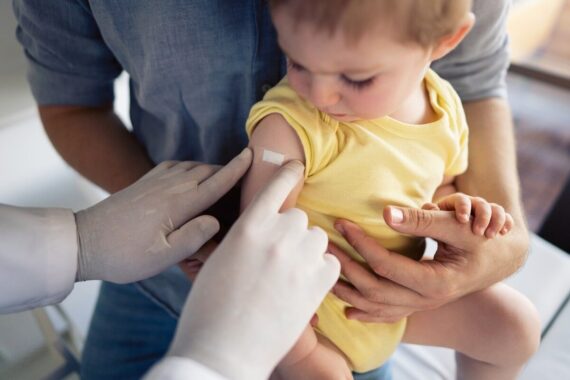GPs urged to check patients’ vaccination status after polio virus detected in UK

GPs should opportunistically check that patients are up to date with polio vaccination, UKHSA has said, after the virus was detected in sewage from North and East London.
Patients have also been urged to contact their GP if they or their children are not vaccinated against polio.
UKHSA said it has launched an investigation after ‘several closely-related viruses were found in sewage samples taken between February and May’.
‘The virus has continued to evolve and is now classified as a “vaccine-derived” poliovirus type 2 (VDPV2), which on rare occasions can cause serious illness, such as paralysis, in people who are not fully vaccinated,’ the public health alert said.
It is likely that there has been ‘ some spread between closely-linked individuals in North and East London and that they are now shedding the type 2 poliovirus strain in their faeces’.
People should contact their GP surgery to book a vaccination, should they or their child not be fully up to date, the alert said.
In linked guidance, UKHSA said healthcare professionals are ‘strongly encouraged to fully investigate and report any suspected cases of acute flaccid paralysis / acute flaccid myelitis (AFP/AFM) not explained by a non-infectious cause’ (see box).
It added that primary care colleagues and school aged immunisation providers should:
- opportunistically check that patients are up to date with their polio-containing vaccines and catch-up anyone who is un/under vaccinated. This is particularly important in practices where vaccine coverage for the primary DTaP/IPV/Hib/HepB course is below 85%
- check immunisation status of newly registered children and adults with a particular emphasis on new migrants, asylum seekers and refugees – bring them up to date with the UK schedule at the earliest opportunity
The last case of wild polio contracted in the UK was confirmed in 1984 and the UK was declared polio-free in 2003.
Dr Vanessa Saliba, consultant epidemiologist at UKHSA said: ‘Vaccine-derived poliovirus is rare and the risk to the public overall is extremely low.
‘Vaccine-derived poliovirus has the potential to spread, particularly in communities where vaccine uptake is lower. On rare occasions it can cause paralysis in people who are not fully vaccinated so if you or your child are not up to date with your polio vaccinations it’s important you contact your GP to catch up or if unsure check your Red Book.
‘Most of the UK population will be protected from vaccination in childhood, but in some communities with low vaccine coverage, individuals may remain at risk.’
She added that UKHSA is ‘urgently investigating to better understand the extent of this transmission and the NHS has been asked to swiftly report any suspected cases to the UKHSA’, however ‘no cases have been reported or confirmed so far’.
Jane Clegg, chief nurse for the NHS in London said: ‘The majority of Londoners are fully protected against polio and won’t need to take any further action, but the NHS will begin reaching out to parents of children aged under five in London who are not up to date with their polio vaccinations to invite them to get protected.’
Meanwhile, amid the recent outbreak of monkeypox in the UK, UKHSA has advised that some at-risk gay and bisexual men should be offered the smallpox vaccine.
Advice for healthcare professionals
Acute flaccid paralysis/myelitis is characterised by rapid onset of weakness of an individual’s extremities, often including weakness of the muscles of respiration and swallowing, progressing to maximum severity within 10 days. The term ‘flaccid’ indicates weakness accompanied by hyporeflexia or areflexia in the affected limb(s).
Any patient meeting the above case definition, should:
i. be reported by calling the UK Health Security Agency (UKHSA) national duty doctor line (020 8200 4400) between 9am and 5.30pm 7 days a week
ii. have the following samples collected and sent to the UKHSA Virus Reference Department for poliovirus isolation and further characterisation:
a. 2 stool samples 48 hours apart
b. throat swabs / nasopharyngeal aspirate (NPA) and
c. cerebrospinal fluid (CSF) (if collected)
iii. have an enhanced surveillance questionnaire completed by their responsible clinician
In addition, stool samples are encouraged for all acute neurological illness presentations including meningitis – see national polio guidance.
Source: UKHSA
Pulse October survey
Take our July 2025 survey to potentially win £1.000 worth of tokens

Visit Pulse Reference for details on 140 symptoms, including easily searchable symptoms and categories, offering you a free platform to check symptoms and receive potential diagnoses during consultations.
Related Articles
READERS' COMMENTS [1]
Please note, only GPs are permitted to add comments to articles











Could UKHSA make it clear whether they have only detected the presence of Polio-vaccine-related-virus shed by vaccinated people (which we already know happens in a large proportion of such vaccinees), OR have they detected something different, and which indicates any significant problem?
A scare tactic MAY work at increasing basic immunisation coverage, or it may deflect attention from the need for Covid and smallpox vaccines, OR it may just inure the population to scary stories about viruses, and consequently lead to reduced use of IPC precautions, and increased disfigurement by monkeypox and disability from long covid.